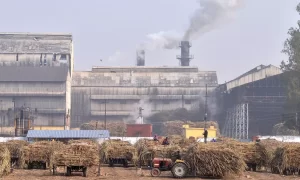UP to expand fortification efforts, distribute fortified wheat flour through PDS

Uttar Pradesh will begin distributing fortified wheat flour through the Public Distribution System, aiming to combat widespread anaemia. Announced at the 19th State Connect Programme in Lucknow, the move builds on ongoing rice fortification. With support from FSSAI and CII, the initiative seeks to enhance nutritional security, food safety, and compliance through technology, awareness, and industry collaboration.
Uttar Pradesh is set to expand its food fortification efforts by piloting the distribution of fortified wheat flour through the Public Distribution System (PDS). The announcement was made during the 19th State Connect Programme, jointly organised by the Food Safety and Standards Authority of India (FSSAI), Uttar Pradesh State FDA, and the Confederation of Indian Industry – Food and Agriculture Centre of Excellence (CII-FACE) in Lucknow on Thursday.
Ranvir Prasad, principal secretary, civil supply and consumer protection, highlighted that over 40% of the state’s population is affected by anaemia. To address this, the government has already implemented rice fortification across 865 PDS outlets, 1,823 Anganwadi centres, and 102 rice mills, benefiting around 19.17 lakh people. The state’s next step—piloting wheat flour fortification—is expected to further combat micronutrient deficiencies and boost nutritional security.
A dedicated session on large-scale fortification brought together industry experts and organisations such as PATH, GAIN, Fortify Health, Technoserve, KHPT, and WFP. These stakeholders shared best practices and technological innovations to enhance the fortification of staples like rice, wheat, edible oil, and milk. Supported by the Gates Foundation, CII aims to use this platform to drive improved compliance and manufacturing standards.
With 35% of India’s wheat and sugarcane output and significant food processing infrastructure, Uttar Pradesh continues to strengthen its food safety ecosystem. The expansion of food testing labs to 18 across the state signals a focus on improved lab capacity and safety monitoring.
Ranjan Kumar, principal secretary of Ayush and Food Safety & Drugs Administration, emphasized awareness campaigns and digital monitoring tools aligned with the Viksit Bharat vision. Dr SK Panda from FSSAI reinforced the importance of FBO registration on the FoSCoS portal and robust risk-based inspections.
FSSAI also conducted hands-on training on digital compliance through live FoSCoS demonstrations, while sessions covered detection of milk adulterants and food contaminants, with a lab demo at CSIR-IITR enhancing practical understanding among officials.
To Read more about Wheat News continue reading Agriinsite.com
Source : Hindustan Times















